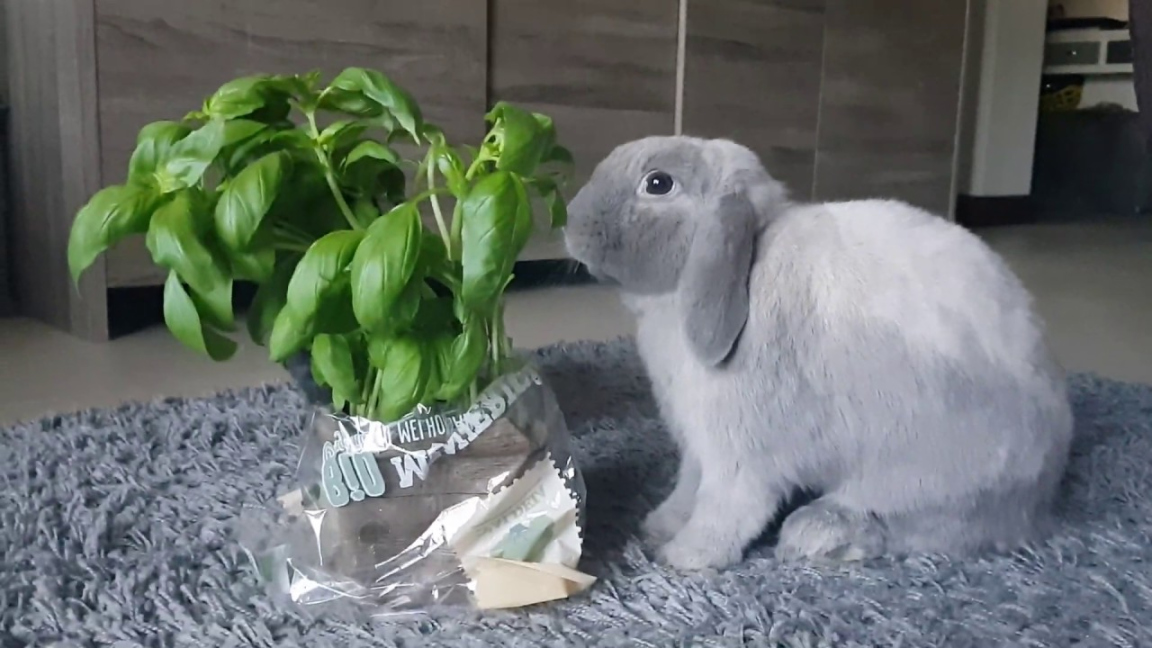Can Rabbits Eat Basil?
Rabbits are herbivores, which means their diet mainly consists of plant-based foods. They require a variety of vegetables, fruits, and herbs to ensure they receive the necessary nutrients for optimal health. Basil is one such herb that rabbits can safely consume and enjoy. However, as with any new food, it is important to introduce basil to your rabbit’s diet gradually and in moderation to avoid any potential digestive issues.

Benefits of Basil for Rabbits
Basil is a popular herb known for its unique aroma and flavor. It contains several nutrients that can be beneficial to rabbits, including:
- Vitamin K: Basil is a rich source of vitamin K, which is essential for blood clotting and bone health.
- Vitamin A: This herb is also packed with vitamin A, which is important for maintaining good eyesight and supporting a healthy immune system.
- Antioxidants: Basil contains antioxidants that help protect cells from damage caused by harmful free radicals.
- Minerals: It provides minerals such as manganese, calcium, and potassium, which are crucial for various bodily functions.
These nutrients can contribute to your rabbit’s overall well-being when incorporated into their diet in appropriate amounts.
How to Feed Basil to Your Rabbit
Before introducing basil to your rabbit’s diet, consult with a veterinarian to ensure it is suitable for your pet and won’t interfere with any existing health conditions or medications. Once you have the green light, follow these guidelines for feeding basil to your bunny:
- Start with small quantities: Begin by offering a small piece of basil leaf to your rabbit and observe their reaction. If they show no signs of discomfort or digestive issues, you can gradually increase the portion size.
- Wash thoroughly: Rinse the basil leaves under running water to remove any dirt, pesticides, or other contaminants. Make sure to dry them properly before serving.
- Offer fresh basil: Always serve fresh basil to your rabbit. Avoid feeding wilted or spoiled leaves, as they can be harmful to your pet’s health.
- Limit the quantity: Basil should be given as a small part of your rabbit’s overall diet. It should not exceed 10% of their daily food intake.
- Monitor for any adverse reactions: Keep an eye on your rabbit after introducing basil to their diet. If you notice any unusual behavior, digestive upset, or allergic reactions, discontinue feeding basil immediately and consult a veterinarian.
Other Safe Herbs for Rabbits
Basil is not the only herb that rabbits can enjoy. There are several other safe herbs you can offer to your furry friend in moderation, including:
- Mint
- Parsley
- Dill
- Cilantro
- Thyme
- Rosemary
Remember to introduce these herbs gradually and monitor your rabbit for any adverse reactions.
Tip: Providing a variety of herbs not only makes your rabbit’s diet more interesting but also helps prevent boredom and provides different nutritional benefits.
Frequently Asked Questions (FAQs)
1. Can rabbits eat basil stems?
While basil stems are not toxic to rabbits, they can be tough and difficult to chew. It is better to stick to the softer basil leaves and avoid offering the stems to prevent any potential choking hazards.
2. How often can rabbits eat basil?
Rabbits can eat basil as a treat a few times a week. However, it should not be a significant portion of their regular diet. Variety is key, so make sure to offer a balanced mix of vegetables, hay, and pellets along with occasional herbs.
3. Are there any herbs that rabbits should avoid?
While many herbs are safe for rabbits, some should be avoided due to potential toxicity or digestive issues. These include:
Rhubarb
Tarragon
Chives
Mint (in excessive amounts)
Always consult with a veterinarian before introducing new herbs to your rabbit’s diet.
4. Can rabbits eat dried basil?
It is generally recommended to feed rabbits fresh basil rather than dried basil. Dried basil may lose some of its nutritional value and can be less appealing to rabbits. Always prioritize fresh, high-quality ingredients for your pet’s diet.
Related Articles…
Copyright Notice:
Images displayed on this website are not our property, but are procured from the internet. If you hold copyrights to any image and wish for its removal, please get in touch with us.